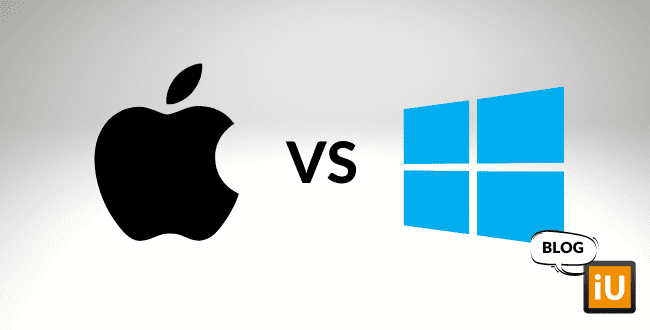28/11/2021

What is the difference between Apple and Windows for business use?
In our webshop, we only sell Apple MacBooks and no Windows laptops. It's already clear that we have a preference for Apple, and in this article, we explain the differences between Apple and Windows for business use. Below, we list three major differences for you.
Apple is known for its strong security. A Mac has a firewall that prevents unauthorized apps, programs, and services from accessing your Mac. Additionally, there's something called FileVault. FileVault protects the data on your disk by encrypting its contents. All of this happens automatically, so you don’t have to worry about it.
With a PC, you get Windows 11 Home by default. However, this software lacks key security features. For example, BitLocker is missing (which is comparable to Apple's FileVault). If you want this security feature on your PC, you'll need to purchase Windows 11 Pro, which costs around €150 or more for a license. Additionally, only Windows 11 Pro offers features useful for business management, deployment, and security. For instance, with Windows 11 Pro, you can manage devices remotely, receive special updates for businesses (which saves on management costs), and group user accounts. You can find all the differences between Windows 11 Home and Windows 11 Pro here.
Lastly, let’s consider residual and resale value. The residual value is the value of a product at the end of its lifespan. The residual value of a PC after three years is about 10%, while that of a Mac is at least 25%. If you want to sell your Mac after a few years, you’ll get twice as much for it compared to a PC.
To install Windows 11 Home, your PC must meet certain specifications. Your PC must have at least an 8th generation Intel Core processor (or the Pentium/Celeron equivalents of that generation) or AMD’s Ryzen 2000 or higher. It must also contain a 64-bit chip, so older generations are out of luck. Fortunately, Windows has promised to support Windows 10 until October 2025.
You can draw your own conclusion, but we swear by Apple for the business market. The purchase price may be higher, but the operational costs are much lower. Additionally, security is top-notch, and you benefit from a higher resale value. A Mac is also easier to use, so less support is needed. Would you like to know what Apple devices can do for your organization? Contact us via [email protected] or call 030-248 40 06.
The purchase price and additional costs
It is well known that the price tags of Apple laptops are higher than Windows laptops. If you compare a laptop with a similar processor, memory, storage, and graphics card, a Mac is more expensive than a PC. But you really need to look beyond just the specifications.Apple is known for its strong security. A Mac has a firewall that prevents unauthorized apps, programs, and services from accessing your Mac. Additionally, there's something called FileVault. FileVault protects the data on your disk by encrypting its contents. All of this happens automatically, so you don’t have to worry about it.
With a PC, you get Windows 11 Home by default. However, this software lacks key security features. For example, BitLocker is missing (which is comparable to Apple's FileVault). If you want this security feature on your PC, you'll need to purchase Windows 11 Pro, which costs around €150 or more for a license. Additionally, only Windows 11 Pro offers features useful for business management, deployment, and security. For instance, with Windows 11 Pro, you can manage devices remotely, receive special updates for businesses (which saves on management costs), and group user accounts. You can find all the differences between Windows 11 Home and Windows 11 Pro here.
Lastly, let’s consider residual and resale value. The residual value is the value of a product at the end of its lifespan. The residual value of a PC after three years is about 10%, while that of a Mac is at least 25%. If you want to sell your Mac after a few years, you’ll get twice as much for it compared to a PC.
Operational costs for performing IT services
Once you have ten computers or laptops, you'll need an administrator or department to handle app updates, setting permissions, remote wiping, and other tasks. These costs are generally lower for Mac users than for Windows users. Why? A Mac is simply much more user-friendly than a Windows PC. With Apple devices, you can easily set up the steps your employees need to follow to install the device using Mobile Device Management. Furthermore, Windows users encounter issues two to six times more often per year. Problems with Macs also tend to be resolved faster than with PCs.Software updates and operating systems
With a Mac, you get macOS for free. This is Apple’s standard operating system. When you buy a Mac, you get the operating system with all future updates for the entire lifespan of the device. Macs are supported for a minimum of five years and a maximum of nine years. Even when your Mac is no longer supported, you can still use the penultimate operating system for a while with free updates. The latest version, macOS Monterey, can still be installed on a Mac from 2015. So, even nine years later, you can still install the update.To install Windows 11 Home, your PC must meet certain specifications. Your PC must have at least an 8th generation Intel Core processor (or the Pentium/Celeron equivalents of that generation) or AMD’s Ryzen 2000 or higher. It must also contain a 64-bit chip, so older generations are out of luck. Fortunately, Windows has promised to support Windows 10 until October 2025.
In summary:
- The purchase price of a Mac is higher;
- Apple has better security, and you don’t need to purchase additional licenses for it;
- To get BitLocker and business management features, you need to buy Windows 11 Pro;
- The residual and resale value of Apple products is higher;
- Operational costs for Mac are significantly lower;
- You can update a Mac to the latest operating system for up to nine years;
- Windows 11 Home is free to download, but your PC must meet certain requirements.
You can draw your own conclusion, but we swear by Apple for the business market. The purchase price may be higher, but the operational costs are much lower. Additionally, security is top-notch, and you benefit from a higher resale value. A Mac is also easier to use, so less support is needed. Would you like to know what Apple devices can do for your organization? Contact us via [email protected] or call 030-248 40 06.

